To B Corp or not to B
Sustainability Editor Megan Hickling explores how companies like RWD are achieving meaningful sustainability solutions through B Corp accreditation…
In an era where Environmental, Social and Governance (ESG) considerations are no longer optional, businesses are increasingly embracing the opportunity to align with a more responsible and impactful way of operating. From shifting consumer expectations to the undeniable realities of climate change, the drive towards sustainability is reshaping industries around the globe.
Certification as a roadmap
One of the keyways businesses can demonstrate meaningful progress in sustainability is through third-party certifications, such as B Corporation accreditation. These certifications act as a tangible measure of a company’s efforts, verifying improvements across governance, environmental impact and community engagement. By providing transparency and accountability, they give businesses a way to substantiate their claims and consumers a way to make informed choices.
The demand for authenticity
While the push for sustainability has led many companies to embrace eco-friendly initiatives, it has also brought an increase in greenwashing – when businesses exaggerate or mislead about their environmental claims. This has made it all the more important for businesses to pursue authentic solutions, as consumers become increasingly skilled at distinguishing genuine efforts from superficial ones. Certification, like B Corp, offers a clear way to cut through this noise by holding businesses accountable and providing a credible framework for improvement.
What is B Corp?
In many cases, a third-party certificate is deeply rooted in how the business operates. This is the case for B Corp and the ISO14k family, which is the standard for environmental management systems. These tend to be quite holistic in terms of efforts needing to be made across all aspects of the organisation. B Corp in particular addresses the trifecta of ESG – the Environmental, the Social and the Governance. This makes sure that not only is the business addressing its environmental footprint, but it is also functioning better for its stakeholders too.
To become a B Corp, a business must score a minimum of 80 out of 200 points across five key areas: Governance, Workers, Community, Environment and Customer. The scoring reflects a company’s activities in these areas, such as measuring and tracking ESG metrics, implementing a mission statement and ethics policy, and monitoring resource consumption.
RWD’s B Corp journey
British design studio RWD is among the few in the superyacht industry to achieve B Corp certification, a milestone they reached in 2022. With recertification due this October, Superyacht News sat down with the team to discuss their journey to certification and the meaningful changes it has inspired within their business.
“Our motivation was to have a positive impact and inspire our community, the environment and the industry at large,” explains Chris Townsend, director at RWD, when reflecting on why the studio embarked upon certification. This ambition led them to review various business standards and certifications. B Corp stood out for its holistic approach – it boasts a rigorous, auditable and verifiable framework that ensures accountability and drives continuous improvement.
“Globally, we’re in a transitional period where we should all be striving to place care and environmental concerns at the heart of what we do,” Townsend emphasises. “Of course, progress takes time – none of us can move as quickly as we’d like – but as B Corp demonstrates, it is far better to push for constant improvement than to sit on the sidelines, doing nothing or believing we can carry on as we always have. It is a journey.”
For Mel Gray, RWD’s head of sustainability and HR, being a B Corp has helped centre the company’s sustainability priorities – ESG considerations are now embedded into every decision. “You have to live it every day,” she stresses. After an initial assessment, RWD made several adjustments to meet the minimum requirements for B Corp certification, with most of these changes involving improving documentation, planning and tracking of the company’s existing activities and intentions. “We were fortunate that many of the principles B Corp embodies – such as treating employees with care and respect – were already ingrained in RWD’s culture, thanks to the way the company was originally set up,” explains Gray. Arguably the most significant and complex change was amending the company’s legal framework to include the environment as a stakeholder within its Articles of Association. “This was a big step, but it was crucial in becoming a truly purpose-driven organisation with sustainability at our core.”
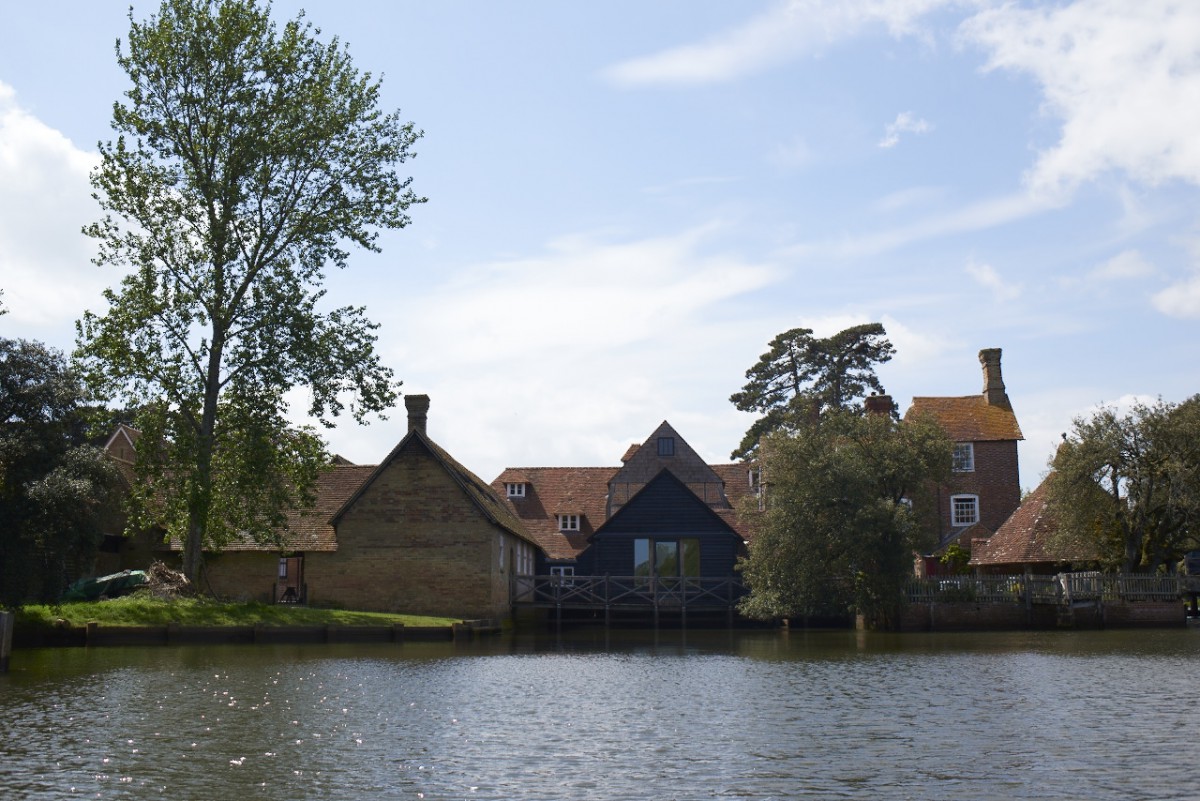
RWD mill studio from the water
Making business a force for good
“One advantage our industry has over others is clients with the capacity to invest significantly in innovation,” says Ollie Stacey, RWD’s head of yacht design. “This gives us a real opportunity to lead the way in developing sustainable solutions and setting not just new industry standards, but global ones." While sustainability may not be the primary focus for every client from the outset, RWD has found that its integrated approach attracts projects where innovation, long-term impact reduction, and planet-friendly solutions are valued. “B Corp has shown us that by investing time internally in our processes, supplier relationships, and initiatives, we can inspire wider progress,” he explains.
A key part of that progress has been re-evaluating the company’s operations and supply chain through the B Corp certification process. This deep dive has provided valuable insights into both internal practices and supplier transparency. “Engaging with the supply chain has been fascinating,” says Laura Nagy, senior interior designer at RWD. “It’s given us a real in-depth understanding of how everything is made, what impacts to look for, and the right questions to ask.”
For both Gray and Nagy, the past few years as a B Corp have reinforced the privilege of working with bespoke suppliers. The certification’s emphasis on supporting small and independent businesses has strengthened long-standing relationships and encouraged new ones. “We see our suppliers and collaborators as partners in our journey toward greater sustainability and ethical responsibility,” says Nagy. “Many of these relationships have been built over years of trust and collaboration, which gives us a strong foundation to ensure our values align.”
This shared commitment to progress has had a far-reaching impact. “It’s not just about meeting standards but about raising them collectively,” Gray explains, noting that some suppliers have even been inspired to begin their own journey toward certification. She describes B Corp as an open and welcoming community that provides a continuous resource for learning and mutual support, no matter where a company is on its sustainability journey.
Beyond B Corp, RWD’s commitment to industry-wide progress is also demonstrated through its involvement with the Water Revolution Foundation, a non-profit dedicated to promoting sustainability in the superyacht industry. As active contributors to their initiatives, including the recently published Designers’ Protocol, RWD collaborates with industry partners to drive meaningful change. “Luxury yacht design is a collaborative process, and as the designers, we’re there at the very start,” explains Stacey. “This gives us a unique opportunity to set the tone and ambition of each project, balancing our clients’ needs with innovative, sustainable solutions.”
Gray hopes this ripple effect will encourage more companies in the industry to take action. She aspires for RWD to inspire others, emphasising that for any company willing to invest the effort, B Corp is “100 per cent the best roadmap to make business a force for good.” True to the collaborative spirit of B Corp, the RWD team is open to sharing insights with any company considering certification, helping them navigate the process and take their first steps toward a more responsible future.
The ISO14k family
The ISO14000 family (otherwise known as the ISO14k family) relates to environmental management and helps businesses manage their environmental responsibilities. ISO14001 is the most popular of these and sets out the criteria for an environmental management system. To achieve this standard an organisation must assess its environmental impact and risks and follow the ISO framework to set out a holistic management system to improve its environmental performance. Within the industry, Environmental Training for Yacht Crew (ETYC) has been certified to this standard since 2019.
Also, within the ISO14k family is ISO 14040, the standard for Life Cycle Assessment, which looks at the impact of a product or service from its creation to its end of life. This methodology is what is used within the YETI assessment.
Both ISO14k or B Corp require continual assessment, with the need to show concerted efforts and improvements made within the organisation’s processes and policies. Infamously, certain brands such as BrewDog have lost their B Corp status after issues within their workplace were discovered.
EcoVadis and other rating systems
EcoVadis is another globally recognised sustainability rating platform, which gives an organisation a score out of 100 with actionable feedback. However, in contrast to the other systems mentioned here, this score is then benchmarked against other businesses’ performance within the same industry. The EcoVadis rating a company receives depends on the percentile their score falls within for their industry. Ratings range from Bronze (top 35 per cent) to Platinum (top 1 per cent). Both D-Marin and Premier Marinas have achieved Silver ratings, placing them in the top 24 per cent of the global leisure industry. Notably, EcoVadis has reported year-on-year improvements in the average scores across its network of assessed companies, reflecting a growing commitment to sustainability worldwide.
In addition to rating platforms, there are certifications that assess specific products based on criteria tailored to the product or its supply chain. These certifications often take the form of ecolabels displayed on packaging. Common examples include Fair Trade, Rainforest Alliance, OEKO-TEX standards, Forest Stewardship Council (FSC) and the EU Energy Label rating system for appliances.
As part of their B Corp journey, RWD is among many organisations encouraging their suppliers to obtain certifications. Gray shares examples such as Woolmark, FSC and the Leather Working Group, noting that these certifications provide “a degree of assurance about the suppliers and their quality and ethics”.
Other designers and those involved in products should be aware of these kinds of certificates in their products and materials. Within the superyacht industry, this would be YETI, Sea Index and Yacht Zero SCII rating, as these rate aspects of the performance of a superyacht.
Care should be taken to keep up with the fast-evolving field to ensure
understanding of the most relevant certification is used.
The closest to this in other industries are the two widely recognised assessments that measure the sustainability performance of buildings, the Building Research Establishment Environmental Assessment Method (BREEAM) and Leadership in Energy and Environmental Design (LEED).
Gray also notes that while tools used in architectural circles have potential applications in the superyacht industry, they are often unsuitable for the unique demands and luxury standards of the sector. To address this, RWD is collaborating within the industry – most notably with the Water Revolution Foundation and the Designers’ Task Force – to develop tools tailored specifically to the superyacht industry.
More similarity to the yachting industry is found in the Green New Car Assessment Programme (Green NCAP) rating. The rating involves looking at the car’s performance across three areas: air pollutants, greenhouse-gas emissions and energy efficiency. The rating system looks at cars with any power system from petrol, plug-in hybrid, to hydrogen. They are looking to expand the assessment from just the driving aspect to include more of the life cycle of the car. Although Euro NCAP is much more widely known, rating car safety, the awareness of green NCAP is rising and so too will its importance within the market.
Interestingly, the only similar ratings for aviation apply to either how the business is run, similar to B Corp, or surrounding Sustainable Aviation Fuel (SAF), primarily focusing on its production, traceability within the supply chain and the reduction of life-cycle emissions compared to conventional fuels.
Alternative frameworks for achieving ESG goals
Certificates such as these can help identify which products and businesses are making recognised improvements compared to business-as-usual cases. However, there are also recognised standards for how businesses report on their ESG-related activities. The two most common and recognised of these are the Global Reporting Initiative (GRI) and the Science Based Targets Initiative (SBTi). These both give a framework to organisations to be able to create robust ESG goals, policies and reports.
GRI is an international and independent standards organisation which provides organisations of any kind with a non-financial/sustainability/ESG reporting framework. KPMG found in a 2022 survey that 78 per cent of the world’s biggest 250 companies by revenue have adopted these standards for reporting.
These frameworks are important to be aware of and will assist in recognising suitably successful
and appropriate sustainability goals and policies.
SBTi provides companies with a path to reduce their emissions to align with the Paris Agreement goals of limiting the global temperature to 1.5 degrees above pre-industrial levels. Their services will check and validate the targets of companies ensuring they align with these goals. For example, within the larger maritime industry, Volvo Group, BMT, Fincantieri and Aqua Expeditions have all aligned their goals with SBTi.
These frameworks are important to be aware of, particularly as reports will increase in the future, while some of these will be due to mandatory regulations such as the Corporate Sustainability Reporting Directive in the EU, and others will voluntarily publish similar reports, to track and publicise their ESG efforts. They will assist in recognising suitably successful and appropriate sustainability goals and policies.
This is also the case for the other standards and certificates which will allow for identifying genuine and effective actions. However, care should be taken to keep up with the fast-evolving field to ensure understanding of the most relevant certification is used.
An opportunity for meaningful change
While the superyacht industry has made strides in assessing the environmental performance of yachts – particularly regarding their propulsion systems and emissions – there remains significant room to address other aspects of sustainability across the sector. A more holistic approach is needed, one that considers the ESG credentials of products, materials and services implemented on board. Incorporating external certifications and standards into procurement processes can ensure that on-board items meet higher sustainability benchmarks than traditional, business-as-usual options.
The Verified Solutions Database from the Water Revolution Foundation offers a promising step forward. By recognising industry-specific solutions that drive improved sustainability, it provides a much-needed resource for the sector to catch up with the progress being made in other industries. However, more effort is required to adopt science-aligned goals, targets and actions at the business level, reflecting the advancements seen elsewhere.
As more companies embrace the benefits of working with certified businesses and products – or indeed pursue certification themselves – there’s an opportunity to drive meaningful change. “B Corp certification is about aligning your business with a larger purpose, one that none of us should ignore, and it’s worth every step,” says Townsend. “For us, it’s been transformative, and we encourage others to take the leap – you won’t regret it.”
In the upcoming issue of The Superyacht Report – New Build Focus, Megan takes a deep dive into how interior designers are pursuing their own sustainability practices, published later this month.
Profile links
NEW: Sign up for SuperyachtNewsweek!
Get the latest weekly news, in-depth reports, intelligence, and strategic insights, delivered directly from The Superyacht Group's editors and market analysts.
Stay at the forefront of the superyacht industry with SuperyachtNewsweek
Click here to become part of The Superyacht Group community, and join us in our mission to make this industry accessible to all, and prosperous for the long-term. We are offering access to the superyacht industry’s most comprehensive and longstanding archive of business-critical information, as well as a comprehensive, real-time superyacht fleet database, for just £10 per month, because we are One Industry with One Mission. Sign up here.
Related news
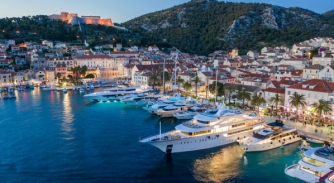
New Year yachting resolutions
An open letter to yacht owners and family offices from the Water Revolution Foundation
Owner
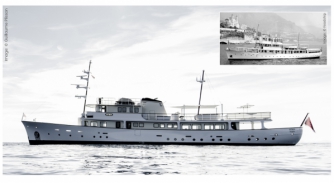
The evolution of YETI
Our sustainability editor speaks with Robert van Tol, executive director of Water Revolution Foundation, about the latest version of YETI and with Bram Jongepie
Technology
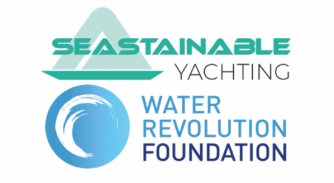
Environmental Crew Guidelines 2.0 to launch at Monaco
Water Revolution Foundation and Seastainable Yachting will be launching Version 2 of the Environmental Crew Guidelines at this year’s Monaco Yacht Show.
Crew
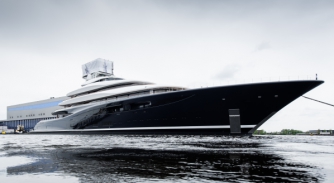
Feadship launches hydrogen fuelled superyacht
It might be the largest motoryacht to be launched in The Netherlands, but Project 821 is grabbing the headlines due to its technological breakthrough
Fleet
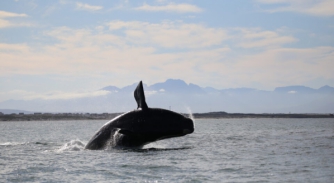
Pelorus granted B Corp certification
The yachting experience specialist has been commended by the non-profit organisation B Lab for having evidenced responsible operating practices and ethics
Crew
Related news
New Year yachting resolutions
4 months ago
The evolution of YETI
4 months ago
Feadship launches hydrogen fuelled superyacht
12 months ago
Pelorus granted B Corp certification
1 year ago
NEW: Sign up for
SuperyachtNewsweek!
Get the latest weekly news, in-depth reports, intelligence, and strategic insights, delivered directly from The Superyacht Group's editors and market analysts.
Stay at the forefront of the superyacht industry with SuperyachtNewsweek



